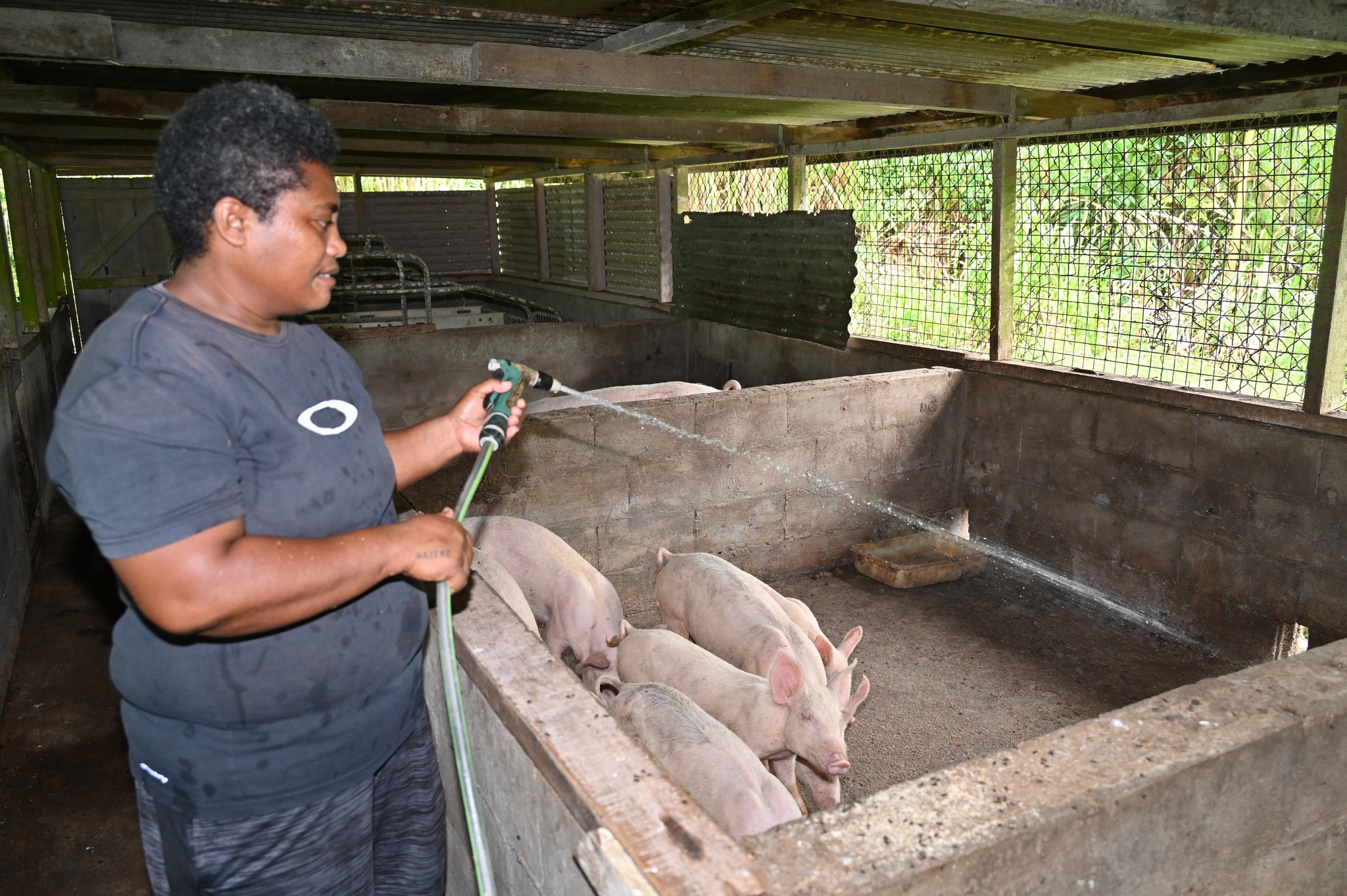TURNING DREAMS INTO A REALITY

Amid the vibrant community of Makoi, 45-year-old Eseta Mauvu has cultivated more than a farm—she has built a lasting achievement.
Originally from Moala, Lau, Eseta turned a dream into a thriving piggery business, reflecting determination, forward-thinking and unwavering belief in her vision.
For many, dreams are fleeting
images, forgotten by morning. But for Eseta, her dream was a revelation.
As she and her family cultivated their land, she had an extraordinary vision—she saw large, healthy pigs roaming right at the very spot where she would eventually build her farm.
“I saw them clear as day, well-fed and thriving,” she recalls.
“When I woke up, I knew I had to make that dream a reality.”
With little more than determination, she cleared the land, removing piles of waste to create a clean, fertile space. From two pigs—one male and one female—she nurtured her farm into a full-scale operation.
“When my first litter of 12 piglets arrived, I knew I was on the right path. That moment solidified my commitment to pig farming.”
Eseta’s farm is more than just a piggery—it’s a model for sustainable living. She has integrated a biogas concrete digester, an ingenious system that converts pig waste into fuel for her home.
“It’s incredible to think that what others see as waste is actually a valuable resource. This system powers my household, reducing our reliance on conventional fuel,” she explained.
She has also developed a unique feeding strategy, sourcing fish from a supplier to supplement the pigs diet.
“Quality feed is crucial for healthy pigs and by adding fish, I ensure they get the right nutrition while also making use of locally available resources.”
Eseta’s piggery is currently home to 33 pigs—10 are breeding females, 2 are breeding males (Duroc and Large White), and the rest are growing piglets. At this stage, she is focused on expanding the herd rather than selling pigs, ensuring the numbers grow to a sustainable level.
“My goal is to build the piggery to a point where I can consistently meet the demand,” she explains.
“Once the cycle is established—with piglets growing, breeding females giving birth, and the herd replenishing itself—it will allow me to supply the market sustainably without interruption.”
By carefully managing the breeding process, Eseta is laying the foundation for a thriving business—one that will not only support her family but also contribute to meeting local demand for quality pork.
Like any journey, Eseta’s path
has been marked by challenges and water scarcity was a major hurdle at first,
with her farm relying on stored water.
“We depended on rainwater tanks, but eventually, we had a pond dug to help clean the pig enclosure. Now, the pigs have a reliable water source.”
She also had to innovate her farming methods. From wooden fences to concrete enclosures, she steadily improved the infrastructure to accommodate the growing herd.
“Every change, every upgrade, was driven by necessity and vision,” she says.
Eseta’s achievements have earned her national recognition, including the prestigious National Woman in Piggery award. But for her, the true victory is proving that women can excel in agriculture.
“Pig farming isn’t just for men. Women are naturally clean and organized, which makes us well-suited for this work.”
Her message to aspiring women farmers is simple yet powerful.
“Don’t be discouraged. If you have land, you can start small and build something meaningful. Even just two pigs inside an enclosure can grow into a profitable business.”
As she looks ahead, Eseta is focused on expansion. She plans to build six additional enclosures, create dedicated spaces for nursing piglets, and install a larger biogas system to further support her farm’s sustainability.
“Every step forward is a step toward a better future—for my family and for the community,” she says.
Her farm, born from a dream, now stands as a beacon of hope. In her hands, pig farming is more than just an occupation; it’s a symbol of resilience, sustainability, and empowerment.
ENDS
